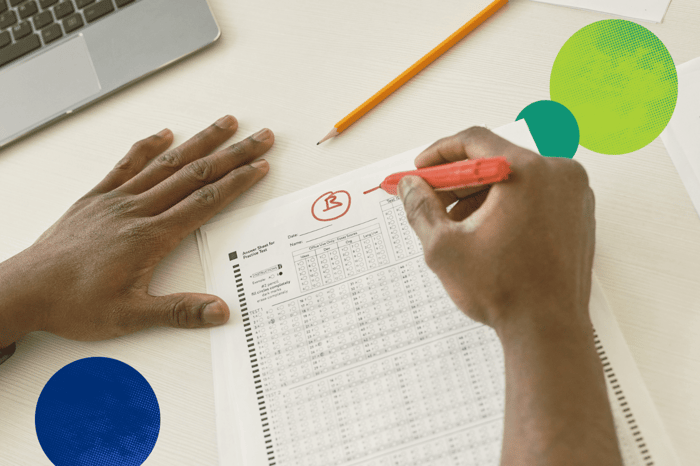TL;DR: A good GPA (grade point average) is the key to future opportunities, from scholarships to getting your foot in the door for your career. To maintain a good GPA in college, set realistic goals, build strong study habits, and stay organized. Prioritize tasks, embrace active learning, and use helpful tools like GPA calculators and other apps to boost your studies. But don’t forget to seek support when needed and take care of your health. Whether you’re a new student or returning to finish your degree, platforms like StraighterLine offer flexible, affordable options to help you succeed while maintaining a good GPA in college.
Table of Contents
- What is Grade Point Average?
- What are GPAs used for?
- What Is a Good GPA in College?
- Why Does a Good GPA in College Matter?
- How to Build Rock-Solid Study Habits for Good Grades
- Time Management Skills for High GPA
- The Best Tools for Staying on Top of College Courses
- Overcoming Challenges in College: We’ve All Been There
- The Latest in Academic Support
- Best Practices to Keep in Mind
- Your Next Steps
- Get Your Free Preview of StraighterLine
What is Grade Point Average?
Grade point average is more than just a number — it’s your academic fingerprint, a key that can unlock scholarships, internships, and even future job opportunities. But let’s be real: maintaining a good GPA in college takes effort, strategy, and a little bit of flexibility.
Whether you’re starting college for the first time, returning to finish what you started, or balancing school with a career or family, understanding what makes a good GPA and how to maintain it is essential. This guide will break it all down with practical tips, tools, and strategies to help you thrive, as well as how you can use online college courses with StraighterLine to boost your GPA.
What are GPAs used for?
GPAs are used as a standardized measure to evaluate your academic performance across courses, making it easier for schools, employers, and organizations to assess your qualifications. They often play a role in determining eligibility for academic honors, internships, and even certain job opportunities, serving as a snapshot of your dedication and ability to meet academic challenges.
What Is a Good GPA in College?
A “good” GPA depends on your goals and the standards of your chosen field. For some, a 3.0 GPA (out of a possible 4.0) is sufficient to meet graduation requirements, while others — especially in competitive fields like healthcare or engineering — may aim for a 3.5 or higher. A strong GPA signals academic consistency, dedication, and readiness to meet future challenges, whether applying for scholarships, internships, or advanced programs. To find out what GPA you need for your field, start by researching the requirements of your desired career or academic program. Look at job postings, graduate school admissions criteria, or professional certification standards to identify common benchmarks. You can also reach out to academic advisors, professors, or professionals in your industry for insights. Understanding these expectations will help you set realistic GPA goals and focus your efforts on meeting the qualifications that matter most for your future success.
Why Does a Good GPA in College Matter?
It’s About More Than Grades
A good GPA in college isn’t just a point of pride — it reflects your academic performance, dedication, and ability to meet challenges head-on. Beyond personal achievement, it can help secure honors and opportunities that strengthen your academic and professional credentials, such as the Dean’s List.
Opening Doors to Future Opportunities
Thinking about grad school or eyeing a competitive internship? Your GPA is often one of the benchmarks considered for admissions committees and employers. A good GPA in college shows that you’re capable of excelling in your studies, but also prepared to tackle the demands of advanced programs or high-stakes professional roles.
Setting Your GPA Goals
Your GPA goals should be more than just a number — they should reflect your personal and professional aspirations. Start by identifying what success looks like for you, whether it’s qualifying for scholarships, gaining admission to grad school, or standing out in a competitive job market. Break your long-term goals into smaller, manageable steps, such as focusing on improving your performance in key courses or maintaining consistency across all subjects. To stay on track, use tools like a GPA calculator to track your progress and make adjustments as needed. Remember, achieving your ideal GPA isn’t just about hitting a target; it’s about building habits and strategies that support your overall success.
How to Build Rock-Solid Study Habits for Good Grades
Plan Your Study Schedule Like a Pro
Consistency is key to staying organized and avoiding last-minute cramming. By using an academic planner or a digital app like Google Calendar, you can map out not only your study sessions, assignment deadlines, and exam prep, but also time for extracurricular activities, work, or family obligations. This proactive approach helps you manage your course load effectively, stay on top of academic responsibilities, and maintain balance in your life. With a clear plan in place, you’ll reduce stress, stay motivated, and feel more in control of your schedule.
Embrace Active Learning
Passive reading? That’s yesterday’s news. Instead, try summarizing concepts in your own words — it’s a simple trick that helps cement what you’ve learned. Better yet, teach the material to a friend or even just explain it out loud; if you can teach it, you truly know it. Flashcards are another game-changer for quizzing yourself and identifying weak spots. These active learning techniques make study sessions more engaging, more effective, and — dare we say — almost enjoyable.
Eliminate Distractions
Creating a distraction-free zone for studying will level up your focus and productivity. Whether it’s a quiet corner in the library, a cozy spot at home, or your desk with noise-canceling headphones on, having a dedicated space helps signal to your brain that it’s time to work. Keep it clutter-free and stocked with everything you need — like notebooks, chargers, or snacks — so you won’t have to break your flow. The right environment makes it easier to stay on track and dive into your coursework with fewer interruptions.
Time Management Skills for High GPA
Master the Art of Prioritization
With a full course load, extracurricular activities, and maybe even a part-time job, prioritizing tasks is essential for staying on top of everything. Tackle high-impact assignments first — those that carry the most weight for your grade or deadline. Plan to work on more challenging tasks during your peak focus hours, whether that’s early morning or late at night. This approach ensures you’re putting your energy where it matters most, leaving smaller or less critical tasks for when your brain needs a breather. It’s all about working smarter, not harder.
Break Things Down
Overwhelmed by a big project? Break it down into smaller, manageable steps to make it less daunting. Instead of staring down an entire research paper, focus on completing one section at a time — whether it's the introduction, body, or conclusion. This keeps you from getting stuck in the details and makes progress feel more achievable. Plus, with each small step completed, you’ll feel more motivated to keep going, and before you know it, the whole project will be finished.
The Best Tools for Staying on Top of College Courses
Academic Planners and Study Apps
From old-school planners to apps like Notion and My Study Life, staying organized has never been more accessible or customizable. The key is finding a system that fits your style — whether you prefer a paper planner or a digital tool — and sticking with it. Once you have a method that works, consistency is everything. With your schedule organized, you’ll have less stress and more time to focus on what really matters — your coursework and personal goals.
Digital Helpers
Apps like Quizlet for flashcards, Grammarly for polished writing, and Evernote for organizing notes are more than just convenience — they can seriously change the way you study for the better. Quizlet helps reinforce key concepts with customizable flashcards, while Grammarly ensures your writing is clear and error-free, so you can focus on the content. Evernote lets you keep all your notes in one organized space, making it easier to find what you need when you need it. These tools aren’t just time-savers; they enhance your productivity and make studying more effective, giving you a real edge in your academic journey.
Tutoring and Support Services
Don’t hesitate to reach out for help. Many colleges offer academic support services like tutoring, writing workshops, and academic advising to keep you on track, and so does StraighterLine. When you take online college courses with us, you’ll have access to these and various other resources to help you along your way.
Overcoming Challenges in College: We’ve All Been There
Tackling Procrastination
Procrastination happens, but it doesn’t have to win. Break larger tasks into smaller deadlines to make them feel more manageable, and give yourself a reward when you hit those milestones — whether it’s a snack, a walk, or a quick break to recharge. Building in short breaks helps keep your focus sharp and your energy up, making it easier to tackle the next task. By creating a system that keeps you motivated and moving forward, you can push past procrastination and stay on track to meet your goals.
Managing Stress and Mental Health
College can be overwhelming — whether you're taking courses online or the traditional way. Balancing your academic load with everything else can be a challenge, but staying healthy is just as important as maintaining a good GPA in college. Prioritize sleep, fuel your body with nutritious meals, and make time for physical activity to keep your energy up. And if stress starts to pile on, don’t hesitate to seek out advising or wellness resources — they’re there to support you, and reaching out can make a big difference in your mental and academic well-being.
Build Your Academic Community
Sometimes, the best support comes from those around you. Study groups and peer mentorship offer fresh perspectives and help break down tough concepts, making learning more collaborative. Don’t forget about your professors — they’re a valuable resource for clarifying material and offering advice. Reaching out for help when you need it can give you the confidence to tackle challenges and keep you on track toward academic success.
The Latest in Academic Support
Flexible Online Learning
Online platforms like StraighterLine make it easier than ever to balance college coursework with your life and get a good gpa in college. With no timelines or deadlines, and the ability to transfer credits to over 3,000 colleges and universities, we offer the academic flexibility many students need.
Tech-Savvy Tools
Tools such as interactive digital textbooks (like those included in StraighterLine courses at no extra cost) and AI study assistants are changing the game, making academic planning and engagement smarter, more efficient, and more affordable. These tools provide personalized learning experiences, helping you understand concepts at your own pace, with instant feedback and support when you need it. With easy access to resources, you can streamline your studies, maximize productivity, and enhance your academic performance — all while saving time and money.
Best Practices to Keep in Mind
Stay Consistent
Academic success isn’t about perfection — it’s about persistence. Keep showing up, even when it feels tough, and remember that every step forward counts. Whether it’s acing a quiz, finishing a tough assignment, or simply staying on top of your schedule, those small wins add up to big progress. Consistency and resilience are key — stay focused on the long game, and you’ll see the results.
Seek Help Early
Whether it’s through academic advising, tutoring, or peer support, reaching out for help can save you from falling behind. Don’t wait until you're overwhelmed — getting assistance early on can clarify difficult concepts and keep you on track. These resources are there for you, offering guidance, encouragement, and tools to help you stay focused and succeed.
Stay Organized
Revisit your academic goals regularly, refine your strategies, and adjust as needed. Staying flexible and adapting to new challenges will keep you on track, even when things don’t go as planned. A little organization and a willingness to adjust your approach can make a huge difference in your long-term success, helping you stay focused and motivated through every semester.
Your Next Steps
Achieving and maintaining a good GPA in college is absolutely within reach with the right strategies and mindset. Here’s how you can start today:
Create a study plan that fits your life
Use tools like GPA calculators, academic planners, and study apps to stay on track
Explore resources like StraighterLine for additional flexibility, affordability, and support
Remember, success in college isn’t a race — it’s about finding what works for you, staying consistent, and taking it one step at a time. By focusing on effective study habits, managing your time wisely, and leaning on available resources, you can set yourself up for success in college and beyond.
Get Your Free Preview of StraighterLine
If you’re looking for a more flexible, affordable way to tackle your college courses while keeping your GPA high, take a look at StraighterLine. With self-paced courses, credits that transfer to 3,000+ schools, and unmatched support, StraighterLine offers the tools you need to get that good GPA you’re working towards, while also helping you save thousands on your education. Check out this free preview to get a sneak peak of how StraighterLine works.












